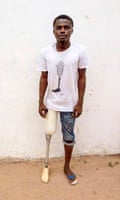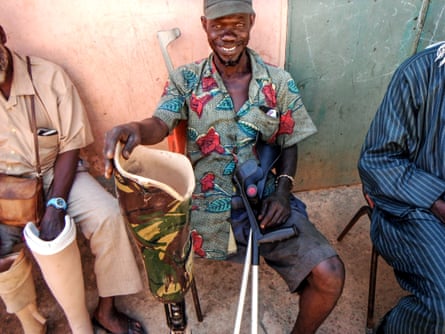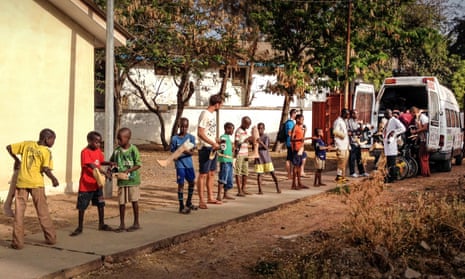Losing a limb is a devastating physical and psychological experience for anyone. For adults and children in countries where prosthetics are not routinely available, it can also mean losing your home, your family and ending up on the streets.
Mohamad Musa, from Sanchaba in western Gambia, has experienced first-hand the harsh reality of life as an amputee. His leg was removed at Banjul hospital in 2014 after suffering pain for many years. Without a prosthetic limb, he spent much of his day “just sitting” and had to leave school in 7th grade.

Now in his twenties, Musa is among hundreds to date who have benefited from recycled artificial legs sent out by UK charities to places where they are desperately needed. Earlier this year, Legs4Africa volunteers arrived in his town and offered him the chance of being fitted with a prosthetic. “They brought me back on my feet,” he explains.
His story and others have been made possible due to effective partnerships. One such collaboration between Limbcare and Legs4Africa resulted in 500 limbs being despatched to Tanzania in May this year. The prosthetics which also include arms and hands will be distributed to a Dar es Salaam hospital where experienced technicians will fit them to those in need. Len Amos, Limbcare’s director of recycling and communication, says: “All of these parts went to a country with no NHS and where an awful lot of children are disowned by their parents because they can’t work, so end up begging.”
The partnership between the two charities began with a phone call. Amos had been asked by a foundation working with underprivileged communities to send out disability equipment. He contacted Legs4Africa founder Tom Williams asking if he wanted to help fill the container destined for Tanzania. By coincidence, Williams had received a request for legs also from Tanzania. Aided by volunteers, they had the limbs tagged, bagged and sent on to their destination.
Limbcare and Legs4Africa obtain second-hand legs from the NHS, private clinics and funeral firms. Under EU laws, prosthetics are classed as medical waste so the NHS cannot reuse them once a patient has outgrown or stopped using them because of a change in health. Instead, around 5,000 are either incinerated or go for landfill every year in the UK.
“There’s no market [for used limbs] in the UK and if we don’t collect them they’ll be destroyed,” explains Williams whose charity collects from nearly a dozen hospitals and clinics. This informal process usually starts with Legs4Africa approaching either senior management or the prosthetist who then fill a box of redundant limbs for the charity to collect. In some cases, trusts will encourage staff to put prosthetics and mobility aids aside. Williams’s dream would be for formal collaboration and partnership between charities and the entire NHS. One country’s waste is another’s opportunity to transform lives, especially in parts of sub-Saharan Africa where prosthetics are not manufactured. “You have to be rich, in the military or the government to receive an artificial limb,” says Amos. “You’d have to be lucky even to get walking sticks.”
Although manufacturers will not guarantee prosthetics for life, secondhand ones are generally perfectly reusable according to Amos. They will be exported to local hospitals where occupational therapists assess people for suitability then engineers adapt the limbs to individual patients. It is a painstaking process. A person’s height has to be taken into account, to ensure the leg section is the correct length, and their weight so the limb doesn’t swing out too quickly.
Diseases such as diabetes, car accidents and civil war are all to blame for an increasing number of people in Africa living with limb loss. Gambia’s only prosthetist, Gabu Jarjue, is based at the Royal Victoria teaching hospital in Banjul which benefited from a Legs4Africa shipment this year. Gambia is a developing nation and disability a low priority, says Jarjue, with the daily life of patients and their families one of “discrimination and exclusion”. His belief is that the sooner Gambia addresses the needs of amputees, the quicker it will realise that a properly rehabilitated patient costs less than a disabled one. “[A prosthetic] leg can be the reason someone rises out of poverty and begins living a life of dignity.”

There is no set structure to how Legs4Africa establishes and maintains partnerships with healthcare professionals like Jarjue and with healthcare institutions. However, hospitals and clinics, which are often referred to the charity by individuals in the community, must meet strict criteria. They must have the facilities and expertise to customise the components sent out by the charity, guarantee not to sell them and be responsible for transporting the prosthetics from port to hospital. “We also ask for reports and photos,” adds Williams.
As for Musa, he’s enjoying having a new prosthetic leg and the opportunities it affords him. He says: “I’m with no pain and thinking of my future – my dream is education.” The aim of charities like Limbcare and Legs4Africa is to get many more like Musa back on their feet. Through partnerships like theirs, this is a very achievable goal.
Join the Healthcare Professionals Network to read more pieces like this. And follow us on Twitter (@GdnHealthcare) to keep up with the latest healthcare news and views.

Comments (…)
Sign in or create your Guardian account to join the discussion